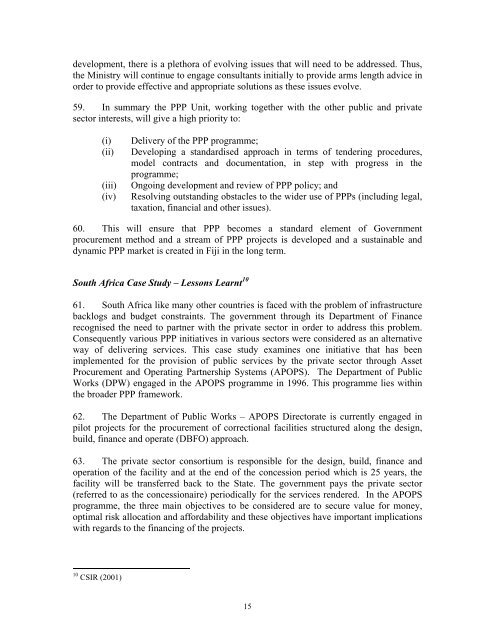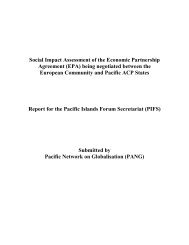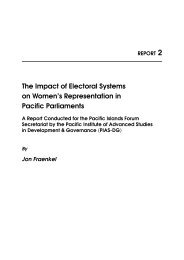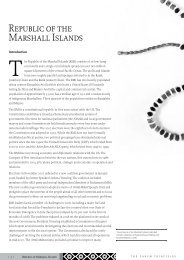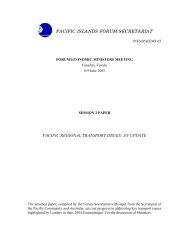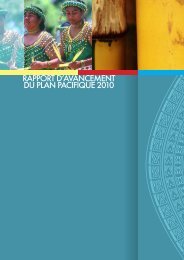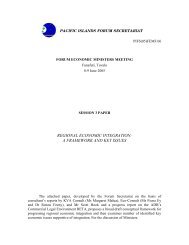PUBLIC PRIVATE PARTNERSHIPS AND BUILD, OPERATE AND TRANSFER (BOT ...
PUBLIC PRIVATE PARTNERSHIPS AND BUILD, OPERATE AND TRANSFER (BOT ...
PUBLIC PRIVATE PARTNERSHIPS AND BUILD, OPERATE AND TRANSFER (BOT ...
Create successful ePaper yourself
Turn your PDF publications into a flip-book with our unique Google optimized e-Paper software.
development, there is a plethora of evolving issues that will need to be addressed. Thus,<br />
the Ministry will continue to engage consultants initially to provide arms length advice in<br />
order to provide effective and appropriate solutions as these issues evolve.<br />
59. In summary the PPP Unit, working together with the other public and private<br />
sector interests, will give a high priority to:<br />
(i) Delivery of the PPP programme;<br />
(ii) Developing a standardised approach in terms of tendering procedures,<br />
model contracts and documentation, in step with progress in the<br />
programme;<br />
(iii) Ongoing development and review of PPP policy; and<br />
(iv) Resolving outstanding obstacles to the wider use of PPPs (including legal,<br />
taxation, financial and other issues).<br />
60. This will ensure that PPP becomes a standard element of Government<br />
procurement method and a stream of PPP projects is developed and a sustainable and<br />
dynamic PPP market is created in Fiji in the long term.<br />
South Africa Case Study – Lessons Learnt 10<br />
61. South Africa like many other countries is faced with the problem of infrastructure<br />
backlogs and budget constraints. The government through its Department of Finance<br />
recognised the need to partner with the private sector in order to address this problem.<br />
Consequently various PPP initiatives in various sectors were considered as an alternative<br />
way of delivering services. This case study examines one initiative that has been<br />
implemented for the provision of public services by the private sector through Asset<br />
Procurement and Operating Partnership Systems (APOPS). The Department of Public<br />
Works (DPW) engaged in the APOPS programme in 1996. This programme lies within<br />
the broader PPP framework.<br />
62. The Department of Public Works – APOPS Directorate is currently engaged in<br />
pilot projects for the procurement of correctional facilities structured along the design,<br />
build, finance and operate (DBFO) approach.<br />
63. The private sector consortium is responsible for the design, build, finance and<br />
operation of the facility and at the end of the concession period which is 25 years, the<br />
facility will be transferred back to the State. The government pays the private sector<br />
(referred to as the concessionaire) periodically for the services rendered. In the APOPS<br />
programme, the three main objectives to be considered are to secure value for money,<br />
optimal risk allocation and affordability and these objectives have important implications<br />
with regards to the financing of the projects.<br />
10 CSIR (2001)<br />
15


